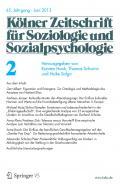
Abstract:
In this article, we address the current debate of increasing work life flexibility in (West-) Germany. In order to shed some light on the contradiction between a widely accepted decrease in work life stability and empirical findings that do not confirm such a decline, we contrast “objective” evidence from occupational trajectories with “subjective” evidence on various dimensions of perceived continuity and discontinuity of job histories. We use the West German part of the German Life History Study for a survival analysis of occupational mobility for cohorts born between 1929 and 1971. Here, using a new concept, we distinguish between direct mobility and indirect mobility which is defined as an occupational change that happens after an employment interruption. In addition, we analyze a new German cross-sectional data set from 2005 on retrospective career perceptions. We employ multinomial regression models to understand whether younger individuals report more unwanted occupational mobility and employment interruptions than older individuals. Our findings indicate that direct occupational mobility has neither increased across cohorts nor has it surged upward for the most recent cohorts, but that there has been an increase in indirect occupational mobility. Furthermore, while there is no higher incidence of unwanted occupational mobility in younger age groups, we find mixed evidence regarding the increased occurrence of unwanted career interruptions in younger age groups. Finally, the desire to experience occupational and firm changes has grown for younger age groups.